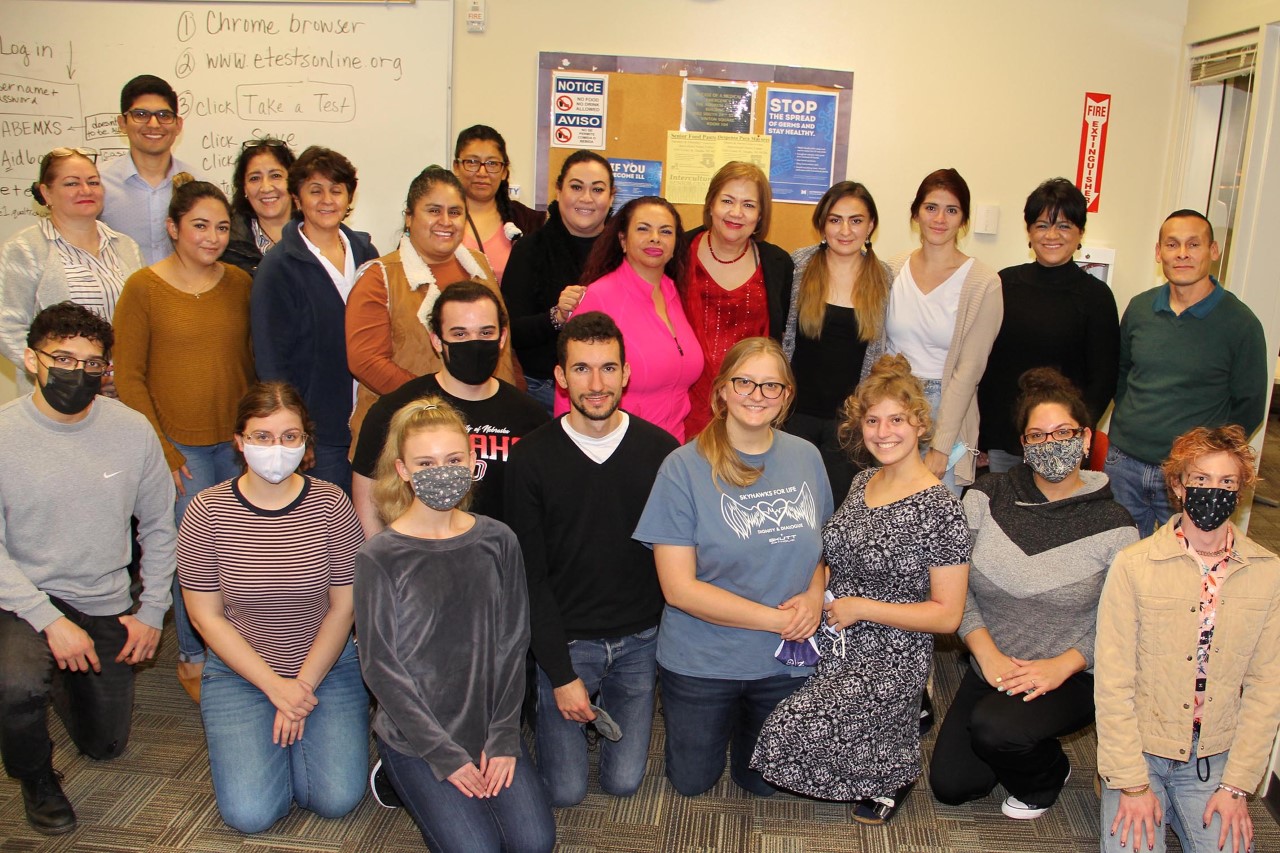State-Led Partnership Gaining Insights from Omaha’s Latino and Minority-Owned Small Business Community

Photo: entrepreneurs and instructors pose for the camera during a recent Business Retention and Expansion meeting in South Omaha.
State-Led Partnership Gaining Insights from Omaha’s Latino and Minority-Owned Small Business Community
Nebraska Department of Economic Development, coalition partners seek to discover opportunities, challenges and the impact of the pandemic impact on South Omaha businesses. New effort complements DED-led business growth partnerships happening in North Omaha.
November 9, 2021 (LINCOLN, NEB.) – A coalition led by the Nebraska Department of Economic Development (DED) is pounding the pavement and picking up the phones to learn from minority- and Latino-owned businesses in South Omaha. The new initiative complements efforts already underway in North Omaha to support and expand the business community.
Marta Sonia Londono is a lifelong entrepreneur and business scholar who migrated to Omaha at the age of 41 to immerse herself in the English language. After arriving, she soon discovered her passion for helping other Latinos and minority business owners break down the barriers that might stand in the way of their full potential.
“Even when you have a strong entrepreneurial spirit, the challenges that face any small business are amplified when you’re immersed in a new culture with a different language and unfamiliar rules and customs,” Londono said. “It can make things like getting a bank loan harder to navigate.”
Don’t get her wrong, she says. The Latino and minority business community in Nebraska is thriving. In fact, Latinos are poised to be one of the largest demographics in the state within the next few decades. For a second- or third-generation immigrant, things like language and tax policy may not be such a problematic issue, but imagine being a first-generation immigrant starting a business for the first time.
Moreover, even first-generation business who are successfully navigating the entrepreneurial ecosystem have suddenly faced the added challenge of adapting to a global pandemic on the fly.
“I talked to a photography studio that was growing so quickly in 2019 the owners had to take out a loan to purchase new equipment. Then 2020 came along and it was time to repay the loan, but the weddings and quinceaneras had disappeared,” she said.
It was during the height of the pandemic, in 2020, when DED Business Development Field Staff approached Londono and her company, Midwest Businesses and Projects LLC, for help examining its effect on the Latino and minority business community in South Omaha.
“That was one goal. Another was to paint a more detailed picture and better understand some of the day-to-day challenges businesses are facing. Asking those kinds of questions is the key to formulating policy and decision-making from an informed perspective.”
“One of our goals is to ensure we make decisions as a state that will help nurture the economic potential of every demographic,” said DED Director Anthony L. Goins. “We want to ensure anyone, from any background, is positioned to succeed here. That means being proactive and initiating conversations with the people who are out there doing business in our communities.”
To kick off the dialogue, Midwest Business and Projects LLC enlisted UNO’s Office of Latino American Studies (OLLAS) for help creating a written survey that has since been administered to hundreds of Latino and minority business owners in the South Omaha zip codes. Other organizations with experience in entrepreneurial issues and strong ties to the Omaha business community have also joined the cause, including Catholic Charities of Omaha, Nebraska Enterprise Fund, the Greater Omaha Chamber of Commerce, the Center for Rural Affairs and the Nebraska Business Development Center.
UNO student volunteers, meanwhile, are going door-to-door and conducting cold calls to collect personal interviews on the issues that entrepreneurs and their businesses routinely deal with.
“This whole project has just been a monumental team effort,” Londono said. “We have been so fortunate to work with an incredible group of people and organizations who have a passion for this community.”
In addition to info-gathering, a series of weekly meetings held over the past six weeks at Metro Community College Express — which volunteered computer lab space for the project — saw entrepreneurs receive free training on small business topics ranging from applying for a bank loan to finding English language resources, before filling out their survey or giving an interview.
“It’s definitely not all about the survey aspect,” Londono said. “We’re also here to provide support. It’s the businesses we are here to serve.”
With the surveys and interviews slated to continue through the New Year, the next step will involve working with OLLAS to decipher the data, after which formal report detailing the coalition’s findings will be released to the public.
“We are still collecting surveys and interviews, so we encourage anyone interested to email mlondono@midwestbusinessprojects.com.”
Though the main phase of the project is nearing an end, Londono says she is confident that the insights gleaned, the relationships forged from building a stronger bridge between the Department of Economic Development, State and local agencies, and the Latino and minority business communities will last a lifetime.
“The pandemic has been hard. But we’re all in this together. It’s by listening to each other and supporting each other that we’ll bounce back stronger than ever.”
Visit opportunity.nebraska.gov.


You must be logged in to post a comment.